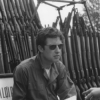Neil Sheehan

Neil Sheehan
Cornelius Mahoney "Neil" Sheehanis an American journalist. As a reporter for The New York Times in 1971, Sheehan obtained the classified Pentagon Papers from Daniel Ellsberg. His series of articles revealed a secret United States Department of Defense history of the Vietnam War and led to a US Supreme Court case, New York Times Co. v. United States, when the United States government attempted to halt publication...
NationalityAmerican
ProfessionJournalist
Date of Birth27 October 1936
CountryUnited States of America
Neil Sheehan quotes about
He's one of five commissioners and he's free to express his concerns.
The commission has said time and time again that issues like emergency planning, spent fuel storage and security should be dealt with in the here and now and not in connection with a license renewal.
Among other things, we will be providing full details of how we intend to approach our Special Inspection of the spent fuel pool leakage and inviting the state to observe those efforts, ... Had we seen any evidence that worker or public health and safety was in any way endangered, we would have responded accordingly.
We wanted to see this country win the war just as much as those advisors did. We felt we would help to do that by reporting the truth. And so there was the moral outrage over this general and the ambassador in Saigon who kept denying the truth we would see.
You remember all those phrases about how these people - Asians - dont value human life like we do. Well if you spend any time around them, you discover that they love their children just as much as we love ours. That is certainly true of the Vietnamese.
The destruction of civilian hamlets, the killing and the wounding of civilians, became vastly greater than it had been before, and it was very upsetting; but I still couldnt bring myself to understand that the policy itself was wrong.
We had a military and political leadership at that period which was genuinely deluded.
Americans, particularly after World War II, tended to romanticize war because in World War II our cause was the cause of humanity, and our soldiers brought home glory and victory, and thank God that they did. But it led us to romanticize it to some extent.
Just because you put higher-octane gasoline in your car doesn't mean you can break the speed limit. The speed limit's still 65.
I never got away from the war. Not because I was obsessed with it in those years, but because it was the event of my generation and I started out covering it so I stayed with it.
World War II had been such a tremendous success story for this country that the political and military leadership began to assume that they would prevail simply because of who they were. We were like the British at the turn of the 19th century.
At least I'm at peace with myself. I have done my best to write a book about what really happened there and why it happened and it's done, it's published. I won't write another book on Vietnam.
I went to Vietnam; it was my first assignment as a reporter for the UPI, and I never could get away from the war.
I think you have to remember that Americans saw their purpose as so innately good that they could excuse the pain they would inflict on others to carry out those purposes. Because the purposes were so good, they would justify this pain we were inflicting on other people.